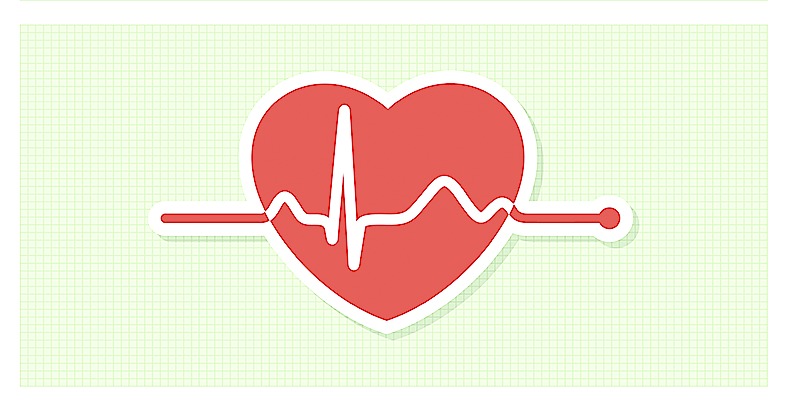
The heart rate can be measured by counting the pulse at the wrist for one minute (or 15 seconds and multiplying by four). The resting heart rate for adults ranges between 60 and 100 beats a minute.
There is a node in the right atrium (one of the chambers of the heart) from which steady electrical impulses are transmitted at the rate of 80 a minute. These pulses cause the rest of the heart to beat. If the electrical impulses become erratic, another node in the ventricle takes over and beats at 40 beats per minute. If the heart rate is controlled by the ventricle, it is called heart block.
The heart rate increases with activity, as the temperature rises, on standing up versus lying down, with emotions like anger and frustration and also with obesity. It is affected by thyroid diseases and medication like beta blockers.
Normally, we are not conscious of the heart's function. Rarely, we feel a fluttering, pounding, a skipped beat or a sudden thump. This is not the increased rate that occurs with exercise. It occurs irrespective of the time of day, activity level or body position. This may be associated with a feeling of fainting. It may suddenly make us conscious of the heart.
If palpitations occur often, a record needs to be kept of their frequency and duration. If they recur several times a month, they need to be evaluated. A sudden lowering of the heart rate may also be associated with loss of consciousness.
Palpitations are usually transient. Tests are usually done once the complaint is made, to establish a diagnosis. ECG, echo cardiogram, treadmill test and a "holter" test (a wearable device to record palpitations is attached to the person for 2-3 days) are usually done.
Heart malformations present from birth can cause palpitations. There may be faulty wiring of the heart, as in the Wollfe Parkinson White syndrome. During adult life, the person may develop prolapse of one of the heart valves, usually the mitral valve. In older people, diabetes, hypertension and a deranged lipid profile can cause palpitations. Anaemia, and hyperthyroidism can cause a rapid heart rate. Hypothyroidism can cause an abnormally slow heart rate.
If the palpitations are secondary to a disease, that needs to be tackled. If there is no obvious abnormality, lifestyle issues need to be addressed.
- Stress and anxiety can be reduced with 40 minutes of aerobic activity and 20 minutes of yoga
- Avoid stimulants such as like caffeine (tea, coffee, cola, Red Bull and other energy drinks)
- Cold or asthma medicines and even inhalers can cause palpitations
- Some herbal medicines promoted for weight loss contain ephedrine or thyroid hormones in the impure form. They can cause palpitations.
- There has to be lifelong control of diabetes, hypertension, lipids, thyroid disease.
- It is essential to stop smoking. Even second hand smoke can be detrimental.
Palpitations need to be taken seriously if there is an underlying heart condition or chest pain radiating to the neck, arm, shoulder or back. Most palpitations can be controlled with medication. If the problem is a complete heart block, pacemakers may have to be used.
Dr Gita Mathai is a paediatrician with a family practice at Vellore. Questions on health issues may be emailed to her at yourhealthgm@yahoo.co.in










